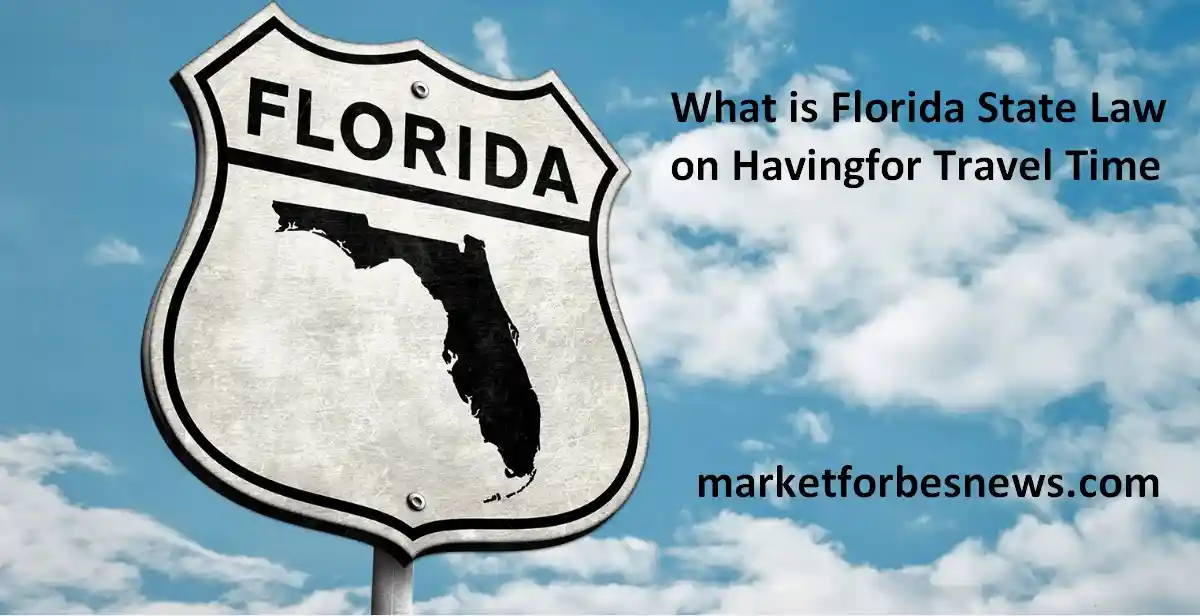What is Florida State Law on Compensation for Travel Time?

Florida has unique labor laws that govern how employees are compensated for their work, including travel time. Understanding how travel time is treated under Florida law is important for both employers and employees to ensure compliance with the Fair Labor Standards Act (FLSA) and other state regulations. If you’re employed in a job that requires travel, you may wonder whether you are entitled to be paid for the time spent on the road. In this article, we’ll take a closer look at Florida state law regarding travel time and how it impacts employee compensation.
Understanding Travel Time Compensation: An Overview
Travel time compensation refers to the wages paid to an employee for time spent traveling as part of their job duties. Whether travel time is compensable or not depends on various factors, such as the type of travel, when it occurs, and whether it falls within the employee’s regular working hours.
Federal Law: The Fair Labor Standards Act (FLSA)
Before diving into Florida state law, it’s important to note that travel time is also governed by federal law under the Fair Labor Standards Act (FLSA). The FLSA requires employers to pay employees for all hours worked, including some types of travel time. However, not all travel time is considered “hours worked,” which is where specific rules come into play.
Now, let’s look at how Florida law interprets these rules for compensating employees for travel time.
Types of Travel Time Covered Under Florida Law
Not all travel time is compensable. Under both federal and Florida state laws, there are different categories of travel time, each with its own set of rules for compensation.
1. Ordinary Home-to-Work Travel
In general, Florida law does not require employers to compensate employees for time spent commuting from home to work. This travel is considered part of the employee’s personal time, and even if the commute is long, it is not considered compensable under normal circumstances.
For example:
- Scenario: You drive 45 minutes each way to your job every day.
- Law: This is not considered compensable travel time, even if the commute is lengthy.
2. Travel During the Workday (Same-Day Travel)
If an employee is required to travel for work during their normal workday, that travel time is compensable. For example, if an employee travels between different job sites or to meet with clients, the time spent traveling is generally considered part of the job and must be compensated.
For example:
- Scenario: You work as a plumber, and during the workday, you travel to multiple job sites to provide services.
- Law: The time spent traveling between job sites is compensable.
3. Overnight Travel for Work
If an employee must travel overnight for work, compensation for travel time depends on when the travel occurs. Travel during normal working hours is compensable, regardless of whether the travel occurs on a weekday or weekend. However, travel outside of regular working hours is generally not compensable unless the employee is actively working during that time.
For example:
- Scenario: You are required to attend a conference in another city, and you leave after regular work hours on a Friday.
- Law: The travel time outside of normal work hours is not compensable unless you are performing work during the trip, such as responding to emails or making business calls.
4. Special Assignment Travel
When an employee is sent on a special assignment away from their regular workplace, the travel time to and from the assignment may be compensable. This situation is different from a daily commute, as the employee is traveling to perform a specific task or attend an event as part of their job.
For example:
- Scenario: You work in Miami, but your employer sends you to Orlando for a one-day special assignment.
- Law: The time spent traveling to and from Orlando may be compensable under certain conditions.
5. Travel for Training or Conferences
If an employee is required to travel for job-related training or a conference, the travel time during regular work hours is generally compensable. This includes time spent traveling to and from the training site, as long as it falls within the employee’s normal work hours. Travel time outside of those hours may not be compensable, depending on the nature of the trip and the employee’s involvement in work-related tasks.
For example:
- Scenario: You attend a work conference, and the travel takes place during your regular 9-to-5 working hours.
- Law: The travel time is compensable, but if you travel after hours or during a weekend, it may not be.

Exceptions and Special Considerations in Florida
While the FLSA provides a broad framework for travel time compensation, there are some exceptions and unique cases where Florida law may offer different interpretations or additional protections for employees.
1. On-Call Travel
If an employee is on-call and required to travel to a work location during their on-call hours, that travel time may be compensable. For example, if a healthcare worker is on-call and must travel to the hospital for an emergency, the time spent traveling would typically be considered hours worked.
2. Employer-Provided Vehicles
If an employer provides a vehicle for an employee to use during travel for work-related purposes, the time spent traveling in the vehicle may be compensable, depending on the circumstances. For example, if an employee is required to drive a company vehicle from one job site to another, the travel time may count as paid work hours.
3. Travel for Remote Workers
With the rise of remote work, many employees may be required to travel for in-person meetings, training sessions, or company events. In such cases, the travel time may be compensable if it falls within regular working hours and is required by the employer.
Employer Responsibilities in Florida
Employers in Florida have a legal responsibility to accurately track employee work hours, including compensable travel time. This means that employers must ensure that they comply with both federal and state labor laws when determining whether travel time should be paid.
1. Clear Policies
Employers should establish clear policies regarding travel time and communicate them to employees. This helps prevent misunderstandings and ensures that both parties are aware of when travel time is considered compensable.
2. Proper Record-Keeping
Accurate record-keeping is essential for employers to ensure compliance with travel time compensation rules. Employers should track employee hours worked, including any travel time that is compensable, and ensure that employees are paid for all eligible time.
3. Fair Compensation
If an employee is entitled to compensation for travel time, employers must pay at least the minimum wage for those hours. Overtime pay may also apply if the travel time pushes the employee’s total work hours beyond 40 hours per week.

Conclusion
Florida state law regarding travel time compensation is closely aligned with the federal Fair Labor Standards Act (FLSA), but there are specific nuances to consider. Travel time for commuting from home to work is generally not compensable, but travel between job sites or during regular work hours is typically paid. It’s essential for both employees and employers to understand when travel time is considered compensable and to ensure that all legal requirements are met.
By establishing clear policies and ensuring proper record-keeping, employers can avoid legal disputes and ensure that employees are fairly compensated for their time spent traveling for work.
FAQs
Q1: Is travel time for commuting to work compensable in Florida?
A: No, travel time for commuting from home to work is generally not compensable under Florida law.
Q2: Do I get paid for travel between job sites during the workday?
A: Yes, travel between job sites or work-related travel during regular working hours is usually compensable.
Q3: Is travel time for attending a work conference compensable?
A: Travel during regular working hours to attend a work conference is compensable, but travel outside of work hours may not be.
Q4: Can remote workers in Florida be compensated for travel?
A: Yes, if a remote worker is required to travel for work-related purposes during regular work hours, the travel time may be compensable.
Q5: Does travel in an employer-provided vehicle count as compensable time?
A: It can, depending on the circumstances. If the travel is work-related and required by the employer, it may be compensable.










